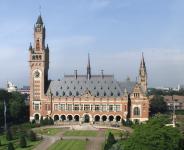 The International Court of Justice, ICJ, on Wednesday continued hearings into the legality of Kosovo’s controversial decision to break away from Serbia.
The International Court of Justice, ICJ, on Wednesday continued hearings into the legality of Kosovo’s controversial decision to break away from Serbia.
Serbia, Kosovo and 29 UN member states, including the US and Russia, are over the next days unveiling their arguments to the Court.
The hearings, which run until 11 December, are looking at whether the decision of Kosovo’s provisional institutions of self-government’s in February 2008 to unilaterally declare independence from Serbia is in accordance with international law.
All five permanent members of the UN Security Council, where a resolution on Kosovo’s independence failed to pass, will participate.
On Wednesday representatives from Albania, Germany, Saudi Arabia and Argentina will be putting forward their views on the case.
Serbia’s delegation opened the debate on Tuesday. The team had three hours in which to argue that the declaration of independence was an ethnically motivated act of secession without precedent in international law.
Expressing confidence that the Court will rule in favour of Serbia, Belgrade’s senior ambassador to France Dusan Batakovic, opened Serbia’s arguments by noting that Kosovo is the cradle of Serbia.
Three experts of international law, from Argentina, the UK and Germany, were also present to speak on Belgrade’s behalf. Andreas Zimmerman, professor if international law at Harvard University, noted that the Security Council reaffirmed Serbia’s territorial integrity as it was aware of Albanian intentions, which were known for decades.
At the end of Serbia’s arguments, the country’s foreign minister Vuk Jeremic told journalists the course that Serbia has chosen is a ”historic contribution to peace in the Balkans”.
”This is first time in history of the Balkans that someone has decided to use peaceful means. This has not been the case in the Balkans until today. We expect that court will decide that unilateralism has not won the day, that you need to sit down carefully, thoughtfully until compromise is found.”
Kovoso’s delegation, led by Foreign Minister Skender Hyseni and British legal expert Michael Wood, also had three hours to demonstrate its arguments.
Kosovo argued that after violating the human rights of Kosovo’s Albanians Serbia had lost its rights to the country, a situation that has been confirmed by the recognition of Kosovo’s independence by more than 60 UN member states.
Presenting his opening arguments Hyseni emphasised that Kosovo’s people have for many years had to right to self determination.
”The will of the people of Kosovo to determine freely their political status goes back many years. This was clear to all the participants in the 1999 Rambouillet Conference…
”It was clear immediately after the 1999 conflict, when (UN) resolution 1244 expressly referred to the Rambouillet accords. It was clear throughout the period of (the UN’s) UNMIK administration, and it was fully discussed and considered throughout the final status negotiations,” said Hyseni.
Wood argued that Serbia was never sincere in its offers of autonomy for Kosovo: ”In the midst of status talks, Serbia adopted the constitution where it confirmed Kosovo as part of Serbia, thus demonstrated to Albanians that it is not interested in finding the solution, and showed what it meant with its offer for autonomy…
Therefore, Serbia showed that Kosovo is only peace of land,” he said.
Reactions Back at Home
Back in Kosovo, the Court’s decision is expected to encourage countries to once again begin to recognise Kosovo.
“So far, 63 countries have recognised Kosovo’s independence without the ICJ’s opinion. Other countries can do the same after ICJ will give its opinion,” Yll Hoxha, from the Club of Foreign Policy, told Balkan Insight, voicing the optimism felt in Kosovo.
Legal analysts in Pristina stress that Kosovo should make it clear that Kosovo also had the right for self-determination when Yugoslavia was destroyed. “Unquestionably, the strongest argument will be the right of people for self-determination,” said Afrim Hoti, international legal analyst.
Following the Court’s decision, he said he thought countries will again begin to recognise Kosovo, though not at such a fast rate as anticipated by many in Pristina. “The best thing is that the recognition process will be unblocked and Kosovo, even at a slow pace, will gain new recognitions,” Hoti added.
Serbia, with strong backing from its ally Russia, won the agreement of the UN General Assembly in October, 2008, for Kosovo’s actions to be heard by the Hague-based court.
In Serbia, professor of international law who was also a representative to Serbia and Montenegro during the ICJ’s hearing between Serbia and Bosnia and Herzegovina, Radoslav Stojanovic, believes that the proceedings should lead to starting new negotiations between Belgrade and Pristina. He sees the partition of Kosovo as the biggest opportunity and greatest success Serbia could make.
But some people in the streets of Belgrade appeared more inclined to put the whole affair behind them.
“This hearing will hopefully bring the Kosovo story to an end so that we can all devote to EU integration regardless of the outcome,” said Ljilja Lacmanovic, 55.
”I think the court’s decision will confirm the illegality of Kosovo’s proclamation of independence but I have no idea what can happen afterwards,” said Ana Kalinic, 23.
 Eurasia Press & News
Eurasia Press & News



